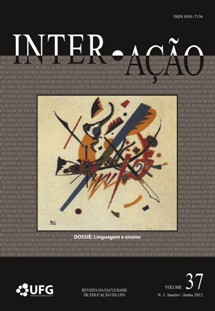FORMATIVE PROCESES ARISING FROM INCLUSIVE PRACTICES IN BASIC EDUCATION
DOI:
https://doi.org/10.5216/ia.v37i1.18872Abstract
This article is the result of a research experience, of a collaborative nature, carried out with a group of teachers from four schools in Porto Alegre’s municipal school network. The genesis of the research process established between the University and the School and the progress of formation meetings and collaborative writing are analyzed. From the theoretical-methodological contributions of action research, a process of ongoing education and collaborative writing is systematized and evaluated. Out of an analysis of the written records of teachers, three aspects can be highlighted, which have the innovative character of the ways of thinking and teaching in basic education: a) the practice of inclusion from the everyday experience of shared teaching; b) formation of teachers from the perspective of research and written authorship; and, c) the understanding of Shared Teaching and collective work in the school as indicators of educational innovation. Finally, it is argued that the movement of ongoing formation, when conducted in a network, leads to improvements in teaching practice and in the qualification of procedures for educational inclusion.Downloads
Downloads
Published
How to Cite
Issue
Section
License
Inter-Ação uses the Creative Commons Attribution 4.0 License for Open Access Journals (Open Archives Initiative - OAI) as the basis for the transfer of rights. Open access means making documents available on the Internet free of charge, so that users can read, download, copy, distribute, print, search, or link to the full text of documents, process them for indexing, use them as input data for software programs, or use them for any other lawful purpose, without financial, legal, or technical barriers.
Authors publishing in this journal agree to the following conditions:
1) Authors retain copyright and grant the journal the right of first publication, with the work simultaneously licensed under the Creative Commons Attribution License, which permits redistribution of the work with attribution and first publication in this journal.
2) Authors are permitted to enter into additional, separate agreements for non-exclusive distribution of the version of the work published in this journal (e.g., for publication in an institutional repository or as a book chapter), with attribution and first publication in this journal.
3) Authors are permitted and encouraged to publish and distribute their work online (e.g. in institutional repositories or on their home page) at any time before or during the editorial process, as this may generate productive changes as well as increase the impact and citation of the published work.















